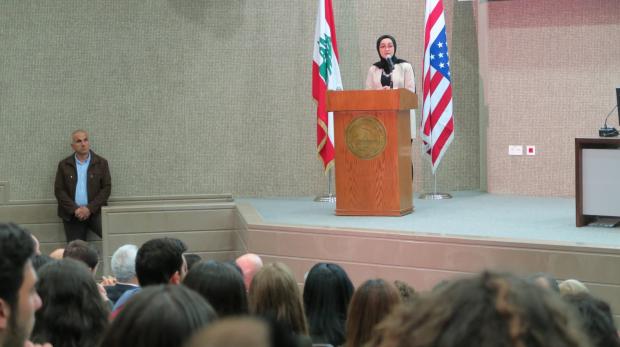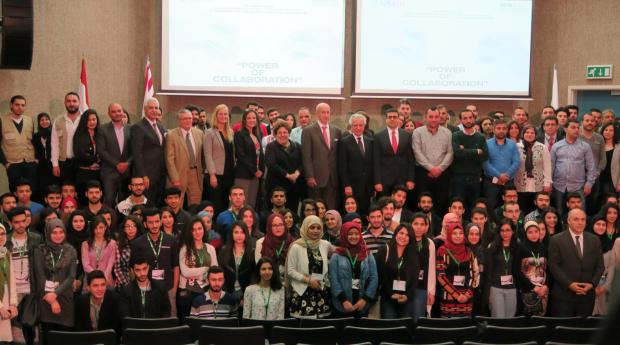USP Hometown event shines a light on successful scholarship initiative
Under the motto of the “Power of Collaboration,” LAU’s University Scholarship Program Hometown Event drew a full house on April 13 at LAU Byblos.
“The only answer to the ills that affect our society, the world over, is education,” declared LAU President Joseph G. Jabbra at the opening ceremony. Addressing the students he said, “You are our only hope. Take advantage of this opportunity that’s been made available to you. Don’t waste a second.”
This special event, which brought together students, faculty, staff, and members of NGOs and governmental agencies, was organized in partnership with Management Systems International (MSI), a U.S.-based development firm specialized in delivering donor-funded community programs. It centered around the institution’s University Scholarship Program (USP), the USP scholars’ successes and their impressive efforts to embody collaboration for the betterment of society.
“Today I stand in front of you proudly introducing myself as a social worker, youth advocate, and more proudly labelling myself as a volunteer,” said scholar Fatima Hallal, who spoke to a packed audience that included USP students from LAU as well as the American University of Beirut (AUB). Hallal, a political science and international affairs student and one of the 217 USP scholars currently enrolled at LAU, attributes her invaluable experience in the scholarship program to an unexpected journey of activism that has taken her to collaborative youth workshops across the region, spanning Jordan, Tunisia, and Morocco.
Indeed, collaboration is a key part of the USP initiative, a merit-based scholarship program that is funded by the United States Agency for International Development (USAID). Students in the program are required to collaborate closely with the community through outreach initiatives and service-related activities on campus, as well as work in partnership with the corporate world by taking on internships.
“The way I put it is you cannot fly except with two wings: an academic wing and a leadership wing,” said LAU’s Assistant Vice President for Outreach and Civic Engagement Elie Samia, who is also USP/USAID program coordinator at the university. “The whole objective is to graduate civic-minded individuals ready to embark on productive positions in Lebanon and abroad in order to help the economic development of the country and region.”
Samia’s presentation during the event highlighted the achievements of USP students and alumni. More specifically, he noted that USP scholars typically had higher GPAs than their non-USP scholars at LAU and tended to find employment quickly after graduation; also that they currently hold 41 leadership offices in university clubs, and have been awarded prestigious Fulbright scholarships. “One can easily benchmark the USP students at LAU and it is a source of pride. It shows clearly that coaching, mentoring, and weekly meetings pay off,” he elaborated.
Speaking directly to the USP scholars in attendance, Deputy Chief of Mission at the U.S. Embassy Danny Hall said, “We applaud you for what you had to do to get the scholarship to begin with. We know you have to work hard. We know also that you commit to volunteering and supporting the community. This is especially important to us in America.”
Exhibition booths hosted by NGOs showcased the various volunteering and internship opportunities available to students. From Caritas and Arsal Coalition to Basmat Amal and Spirit of Youth, there were more than a dozen organizations present. “We are here to share our projects with students who can either intern with Caritas or volunteer on the ground with our Baladi projects, of which more than 30 are ongoing,” said a representative from Caritas.
Since its launch in Lebanon in 2010, and through its $99.5 million investment, the USP program has afforded nearly 750 Lebanese students access to higher education at LAU and AUB. For Hallal, the requirement that students be actively engaged in community service through a community-based project, leadership activities, and volunteer work with NGOs in their hometowns, resulted in a character-building and fulfilling experience. “My fellow USP scholars and I come from humble beginnings,” she said. “However, what we contribute to our communities on and off our campuses is beyond humble.”

